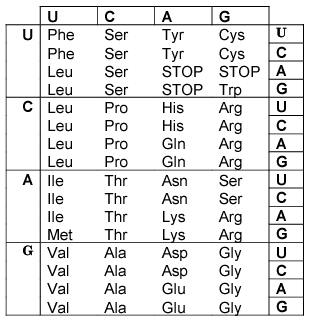

Khorana reminisces how the finding that genes are nucleic acids set the stage for his work on decoding:
While it is always difficult, perhaps impossible, to determine or clearly define the starting point in any area of science, the idea that genes make proteins was an important step and this concept was brought into sharp focus by the specific one gene-one enzyme hypothesis of Beadle and Tatum. The field of biochemical genetics was thus born. The next step was taken when it was established that genes are nucleic acids. The transformation experiments of Avery and coworkers followed by the bacteriophage experiments of Hershey and Chase established this for DNA and the work with TMV-RNA a few years later established the same for RNA. By the early 1950’s it was, therefore, clear that genes are nucleic acids and that nucleic acids direct protein synthesis, the direct involvement of RNA in this process being suggested by the early work of Caspersson and of Brachet.
The first triplet to be decoded was UUU, which specifies the amino acid phenylalanine. This work was done by Nirenberg who found that an RNA consisting of repeating U residues could be translated into a protein containing only phenylalanine. Codons for lysine (AAA) and proline (CCC) were similarly discovered using RNAs containing only A or C. Khorana used both enzymatic and chemical synthesis of oligonucleotides to decipher much of the remaining code. A good account of his work can be found in his Nobel lecture (pdf).
Khorana, together with Robert Holley (structure of tRNA) and Marshall Nirenberg, received the Nobel Prize in Physiology or Medicine in 1968 for their work on deciphering the genetic code.

Of course!
I had seen and used this table before several times, but it is the first time to know about prof.Har Gobind khorana.Â
Thanks a lot for this valuable piece of information and thanks a lot for the Nobel lecture.
Watson and Crick gave us the genetic alphabets but how to assemble thsese alpabets to form a word was discovered by Sir Har Gobind Khorana, we are grateful to him for letting us communicate in genetic language .